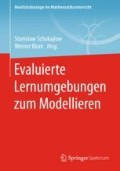Access this chapter
Tax calculation will be finalised at checkout
Purchases are for personal use only
Notes
- 1.
Q1 is a recently completed multi‐storey building in Surfers Paradise.
References
ACARA (2018). Australian Curriculum/Mathematics/Aims. http://australian-curriculum.org/mathematics/aims. Accessed: 24 Jan 2018.
Borromeo Ferri, R. (2007). Modelling problems from a cognitive perspective. In C. Haines, P. Galbraith, W. Blum & S. Khan (Eds.), Mathematical modelling: Education, engineering and economics (pp. 260–270). Chichester: Horwood.
Brown, R., Redmond, T., Sheehy, J., & Lang, D. (2015). Mathematical modelling — an example from an inter-school modelling challenge. In N. H. Lee & K. E. D. Ng (Eds.), Mathematical modelling: from theory to practice (pp. 143–160). Singapore: World Scientific.
Campos, C. R., Ferreira, D. H. L., Jacobini, O. R., & Wodewotzki, M. L. L. (2015). Mathematical modelling in the teaching of statistics in undergraduate courses. In G. A. Stillman, W. Blum & M. S. Biembengut (Eds.), Mathematical modelling in education research and practice: cultural, social and cognitive influences (pp. 501–512). Cham: Springer.
Caron, F., & Bélair, J. (2007). Exploring university students’ competencies in modelling. In C. Haines, P. Galbraith, W. Blum & S. Khan (Eds.), Mathematical modelling: Education, engineering and economics (pp. 120–129). Chichester: Horwood.
CCSSI (2012). Mathematics: standards for mathematical practice – model with mathematics. http://www.corestandards.org/Math/Practice/MP4. Accessed 15 Nov 2014.
Forman, E. A. (1989). The role of peer interaction in the social construction of mathematical knowledge. International Journal of Educational Research, 13, 55–70.
Forman, E. A., & McPhail, J. (1993). Vygotskian perspective on children’s collaborative problem-solving activities. In E. A. Forman, N. Minick & C. A. Stone (Eds.), Contexts for learning: sociocultural dynamics in children’s development (pp. 213–229). New York: Oxford University Press.
Galbraith, P. (2011). Modelling as real world problem solving: translating rhetoric into action. In J. Clark, B. Kissane, J. Mousley, T. Spencer & Thornton (Eds.), Mathematics: traditions and [new] practices. Proceedings of the 34th annual conference of the Mathematics Education Research Group of Australasia and 23rd biennial conference of the Australian Association of Mathematics Teachers, Alice Springs, (Vol. 2, pp. 931–938). Adelaide: AAMT & MERGA.
Galbraith, P. (2015). Modelling, education, and the epistemic fallacy. In G. A. Stillman, W. Blum & M. S. Biembengut (Eds.), Mathematical modelling in education research and practice: Cultural, social and cognitive influences (pp. 339–349). Cham: Springer.
Galbraith, P., & Stillman, G. (2001). Assumptions and context: pursuing their role in modelling activity. In J. F. Matos, S. K. Houston, W. Blum & S. P. Carreira (Eds.), Mathematical modelling and mathematics education: applications in science and technology (pp. 317–327). Chichester: Horwood.
Galbraith, P. L., & Clatworthy, N. J. (1990). Beyond standard models: meeting the challenge of modelling. Educational Studies in Mathematics, 21, 137–163.
Galbraith, P., Stillman, G., & Brown, J. (2010). Turning ideas into modelling problems. In R. Lesh, P. Galbraith, C. Haines & A. Hurford (Eds.), Modeling students’ modeling competencies (pp. 133–144). New York: Springer.
Galbraith, P., Stillman, G. S., & Brown, J. P. (2017). The primacy of ‘noticing’: A key to successful modelling. In G. A. Stillman, W. Blum, & G. Kaiser (Eds.), Mathematical modelling and applications: Crossing and researching boundaries in mathematics education (pp. 83–94). Cham: Springer.
Goos, M., Galbraith, P., & Renshaw, P. (2002). Socially mediated metacognition: creating collaborative zones of proximal development in small group problem solving. Educational Studies in Mathematics, 49, 193–223.
Julie, C. (2007). Learners’ context preferences and mathematical literacy. In C. Haines, P. Galbraith, W. Blum & S. Khan (Eds.), Mathematical modelling: Education, engineering and economics (pp. 194–202). Chichester: Horwood.
Kaiser, G. (2007). Modelling and modelling competencies in school. In C. Haines, P. Galbraith, W. Blum & S. Khan (Eds.), Mathematical modelling: Education, engineering and economics (pp. 110–119). Chichester: Horwood.
Minick, N. (1987). The development of Vygotsky’s thought: an introduction. In R. W. Rieber & A. S. Carton (Eds.), Problems of general psychology. The collected works of L. S. Vygotsky, (Vol. 1, pp. 17–36). New York: Plenum Press.
OECD (2009). Mathematics framework. In OECD PISA 2009 assessment framework: Key competencies in reading, mathematics and science (pp. 83–123). Paris: OECD Publishing. DOI 10.178719789264062658-4-en.
Oke, K. H., & Bajpai, A. C. (1986). Formulation—Solution processes in mathematical modelling. In J. S. Berry, D. N. Burghes, I. D. Huntley, D. J. G. James & A. O. Moscardini (Eds.), Mathematical modelling, models and micros (pp. 61–79). Chichester: Ellis Horwood & Wiley.
Schukajlow, S., & Krug, A. (2014). Do multiple solutions matter? Prompting multiple solutions, interest, competence, and autonomy. Journal for Research in Mathematics Education, 45(4), 497–533.
Stillman, G. (2001). Development of a new research tool: The cognitive demand profile. In J. Bobis, M. Mitchelmore & B. Perry (Eds.), Proceedings of the Twenty Fourth Annual Conference of the Mathematics Education Research Group of Australasia (Vol. 2, pp. 459–467). Sydney: MERGA.
Stillman, G., & Brown, J. (2014). Evidence of implemented anticipation in mathematizing by beginning modellers. Mathematics Education Research Journal, 26(4), 763–789.
Stillman, G. A., Brown, J. P., & Galbraith, P. (2013). Challenges in modelling challenges: intents and purposes. In G. A. Stillman, G. Kaiser, W. Blum & J. P. Brown (Eds.), Teaching mathematical modelling: Connecting to research and practice (pp. 217–228). Dordrecht: Springer.
Treilibs, V. (1979). Formulation processes in mathematical modelling. (Unpublished Master of Philosophy). University of Nottingham, UK.
Zbiek, R., & Connor (2006). Beyond motivation: Exploring mathematical modeling as a context for deepening students’ understandings of curricular mathematics. Educational Studies in Mathematics, 63(1), 89–112.
Author information
Authors and Affiliations
Editor information
Editors and Affiliations
Rights and permissions
Copyright information
© 2018 Springer Fachmedien Wiesbaden GmbH
About this chapter
Cite this chapter
Galbraith, P., Stillman, G., Brown, J., Redmond, T. (2018). A Modelling Challenge: Students Modelling Problems of their Choice. In: Schukajlow, S., Blum, W. (eds) Evaluierte Lernumgebungen zum Modellieren. Realitätsbezüge im Mathematikunterricht. Springer Spektrum, Wiesbaden. https://doi.org/10.1007/978-3-658-20325-2_10
Download citation
DOI: https://doi.org/10.1007/978-3-658-20325-2_10
Published:
Publisher Name: Springer Spektrum, Wiesbaden
Print ISBN: 978-3-658-20324-5
Online ISBN: 978-3-658-20325-2
eBook Packages: Life Science and Basic Disciplines (German Language)

